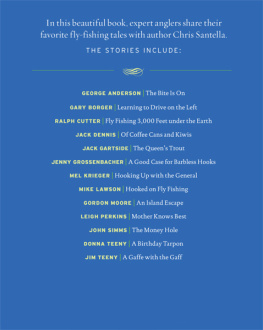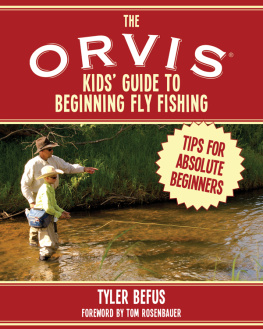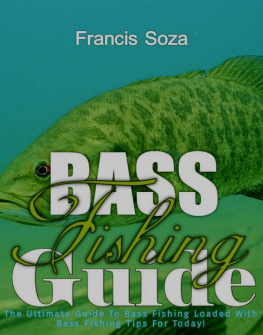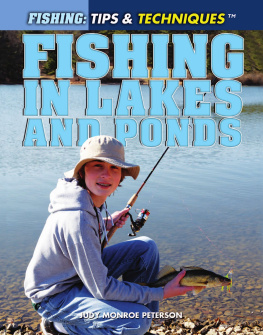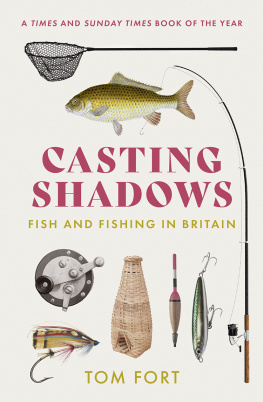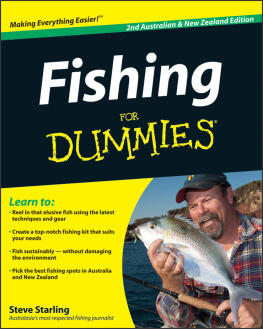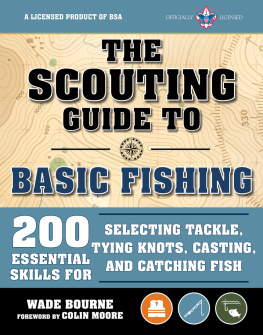The Overlook Press, Peter Mayer Publishers, Inc.
All rights reserved. No part of this publication may be reproduced or transmitted in any form or by any means, electronic or mechanical, including photocopy, recording, or any information storage and retrieval system now known or to be invented, without permission in writing from the publisher, except by a reviewer who wishes to quote brief passages in connection with a review written for inclusion in a magazine, newspaper, or broadcast.
A smudged collection of bankside jottings would never have metamorphosed into this final form had it not been for the regular promptings of Dan Kieran, Tom Hodgkinson and Kevin Parr, editors and correspondent to the Idler magazine. My grateful thanks to them, and also to my youngest daughter, Ellen, who typed up the manuscript sometimes faster than I could dictate it!

FIRST
CAST

The
River
Speaks in
Ripples
H owever eager I am to start fishing there is something about the first glimpse of a river that never fails to stop me in my tracks. Even on a wet winters morning when Im hurrying with all my gear across an open field a river will flag me down before I can find a sheltering tree and for a few moments we have a silent conversation.
First I must have the news, although, with a river, its mostly old news: how the water has risen or coloured since the storm of four days ago; how the weed along a chosen pool has almost disappeared since a gang of swans mowed through it last week; how the flow has lost its energy after a month of clear skies. Obviously this kind of information is important, especially if it feeds my optimism rather than makes me wish Id stayed in bed, but the factual stuff is dealt with in seconds; I must wait a minute longer for whatever else the river has to say.
I am looking at the water now, but it was a morning ago and at a different place that I had my first glimpse of it. I was standing in a sloping field overlooking this small lowland stream as it meandered between high banks overgrown with willow, sedge and alder. I could see that the level was low for the time of year and therefore knew the current would be correspondingly slow and the water probably crystal clear. There was an early morning breeze breaking up the reflections of the trees. A few fallen leaves were floating downstream, but no fishes rippled the surface, nor was there any sparkle in it as the September sun had yet to appear above the hills to the east. As I looked down on the sweeping bend below me something in my memory or my bones made me instantly decide that I should head upstream rather than down towards the more familiar water where Id intended to go. I had never explored the upper reaches of this particular stretch before, but it seemed that today I would be casting into new pools.
The slow breeze swam along with the slow current, making smooth ripples that said it was easier to follow the flow than go against it, especially first thing in the morning when everything must be effortless. Yet below the ripples there was this contradictory voice, a countercurrent, working like divination, but probably triggered by something less mysterious. I think the mornings weather and the mornings light had combined with the river to release the flow of all the countless other rivers Id ever fished. One momentary glance and there was an unconscious welling up of historic waters, superimposing themselves one after the other on the present scene until there must have been an almost perfect match because why else was I suddenly trying to remember a different river that ran through a day similar to this one, but maybe ten, twenty or even thirty years ago?
Happy to be acting on a whim or a seeming whim I turned left and began walking upstream, keeping my eyes on the water as much as I could, although there were occasional willow thickets, hedges and ditches where I lost sight of it and had to turn aside to find a new path. Even where the banks were reasonably clear it was still sometimes difficult to see much of the river. Despite the first witherings of autumn there are sections where bulrush and lily beds remain like bristling forests and gently swaying swamps stretching from bank to bank. In the quieter glides and shallower runs, long streamers of ribbon weed are all yellowing at their tips, making them appear semi-transparent as they weave in the current, but they still obscure much of the actual riverbed and, as I watchfully made my way upstream, they were also concealing what I was looking for.
September: one of the loveliest and most generous months in the anglers calendar. Even if the weather doesnt change much after a hot, dry and miserly August, the lengthening nights, the heavy dews, the cooler mornings and evenings remind the fish that the summer is almost over and they must therefore grab what they can before winter comes. In a few weeks time, after the equinox and the first serious weather of the year, the river will be transformed from a chain of quiet, secretive pools into a deeper, stronger and continuous flow. All the midstream vegetation will be swept away and the fish will have to change their habits and their haunts.
Changing habits and haunts at the end of summer was something I did all through my formative years, just like everyone else, so maybe my urge to explore new territory today was prompted less by a vague memory of another river and more by a conditioned reflex. Sixteen slightly intimidating Septembers, each one confronting me with new classrooms, new tutors, new books and new problems, must have left their mark. Alternatively, Im seeking new water because of a genetic memory, an echo from those millennia when, every autumn, my ancestors followed the migrating herds southwards.
Heading upstream, I naturally had more chance of spotting fish as I was approaching them from behind; however, the rising sun threw a long shadow ahead of me and, at a turn in the river, it must have been cast across a group of chub because there was a sudden plunging splash. Until that moment, all Id seen since Id arrived were shoals of minnows flickering through the few weed-free, shallower glides and it was reassuring to be startled by such a walloping commotion. They must have been quite large fish it looked and sounded as if someone had just heaved in a sack of potatoes but Im convinced they were chub. Several bow waves shot off in different directions, some of them sweeping into the reed bed on the far bank, which is typical of chub if theyre spooked. I crept up to where the ripples were subsiding and waited a few minutes to see if anything was going to reappear.
Years ago, when I was a chub devotee, I would have waited all day just for a glimpse of one of those creatures, but today Im not really interested in them: I have another more resplendent fish on my mind.
Fifty yards after the chub hole, I came to a seductive willow-shrouded pool which seemed to possess all the features Id been looking for: a shelving riverbed where a steady current slowed and divided around the remains of a sunken tree, the main flow deflected over to the far bank, the rest coming round in a slow idling whirl beneath the overhanging willows. There were some frayed late-season lilies and a thin weed bed, but the shade had obviously suppressed their summer growth and, apart from the timber reef, the pool was reasonably free of obstructions. Despite the clarity of the water, the depth, the shade and the reflections made it almost impossible to see if any fish were at home, so I set up my rod and reel, tied on a hook, baited with a worm and cast out.



